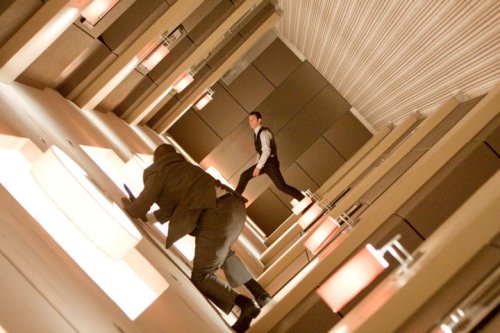HOLLYWOOD—Filmmaker Christopher Nolan’s body of work is incredible. His ability to provide audiences with exhilarating storytelling as well as in depth character studies makes him a force to be reckoned with. I was first introduced to Nolan’s work in my film class where I was forced to write a paper on the film “Memento.” The first viewing of the film left me completely baffled. “What did I just watch and what was the story about?” Those were just a few of the questions I had to ask myself.
The movie about a man unable to generate new memories was riveting upon a second watch, allowing the viewer to decipher important elements missed during the first viewing. I had no idea that people could suffer such a tragic disease; it’s worse than actually losing your memory. His subtle approach with the camera mystifies the audience; it’s so easy to be sutured by a Christopher Nolan film because of the story and his decision to not over analyze a scene. Telling the film through flashbacks and in reverse order was something I’d never seen before. When things become too complex you lose your audience, but Nolan gives and takes from the audience, which keeps you wanting more.
His next film “Insomnia” starring Oscar-winners Al Pacino, Robin Williams and Hilary Swank is a favorite of mine that follows a cat and mouse game between a detective and a killer. There are a few twists along the way that I won’t divulge to those film buffs that haven’t seen the picture. The opening credits of the film immerse the moviegoer into the idea of actually being inAlaska; its beautiful waters, treacherous mountains and densely populated towns. The scene in the film that I appreciate the most is the climatic scene between Will (Pacino) and Hap (Martin Donovan). Did Will intentionally shoot his partner or was it an accident? A question that is likely to haunt viewers for decades.
What I respect most about Nolan is his craft not only as a director (staging the action behind the camera), but his ability to write amazing screenplays. Talent behind the camera is great, but to also highlight that talent on paper is extraordinary. The script is the foundation for the film; so to have the person who drafted the crucial element also play a role in capturing those words on film is astonishing. Many may not know, but Nolan has had assistance on a few of the scripts he’s written by his brother Jonathan Nolan (“Memento,” “The Dark Knight”).
A film can have a wonderful script and be terrible with a bad director, but a film can never be good with a great director, but bad script. If the script is bad, no matter who stars in the film or who directs it, it won’t be magic. Nolan is praised by audiences and critics for his revival of the Batman saga with “Batman Begins” in 2005 and “The Dark Knight” in 2008. I remember seeing “Batman Begins” when it first opened that film struck a cord in me as a screenwriter; I was energized to write and after seeing that film I completed my first full-length screenplay in a matter of days. The choice to dive into the dark realm of Batman resonated on camera with audiences.
Many would have expected a sequel to the film to flop, but “The Dark Knight” surpassed expectations in ways people never imagined. It still holds the record for highest three-day opening weekend at the box-office and it captured the late Heath Ledger an Academy Award for his wickedly, but mesmerizing portrayal of The Joker. There is a scene in the film where Batman (Christian Bale) confronts his nemesis, The Joker, while he’s being detained at the police station. Nolan cleverly plays with the back and forth conversation between the two, but it’s the layout of the scene that’s stunning. The viewer is made to believe they’re inside that room with those two watching as they go back and forth; it’s classic.
His last film, the mind-bending “Inception,” released in July 2010 was a perfect mix of visual phenomenon, great acting and a fascinating story about the power of dreams. Dreams resonate with all of us. We all have them and there’s a thin line between fantasy and reality and “Inception” forced the public to really think twice about what we know to be real and what we think to be real. He knows what he wants to capture on the film and never falters from that image inside his mind. Of course, we’re all patiently waiting for the return of the caped crusader in the now titled “The Dark Knight Rises,” which is expected to conclude Nolan’s chapter in the Batman series. With such praise for the “The Dark Knight” can he deliver magic a second time?
Christopher Nolan has been working as a filmmaker since his early childhood years and if his previous work is any indicator he’s just beginning a career that is likely to span decades. His delicacy of the action staged for the camera and his clever, yet original story ideas will continue to fascinate aspiring filmmakers like myself and audiences for years to come.






